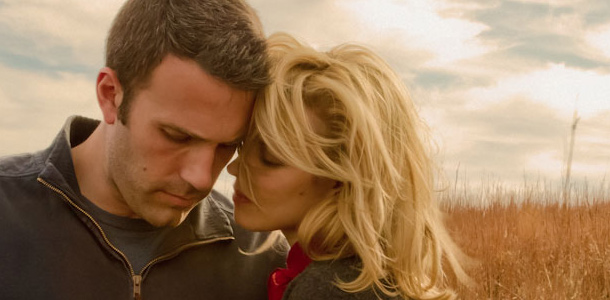Reviews
To the Wonder | TIFF 2012 Review
Wonder Dunder: Malick’s Visual Poem Prayer a Taxing Free Verse
If you’ve happened to read anything about Terrence Malick’s latest film, To the Wonder, chances are, it won’t meet your expectations. That’s not to say that the film is completely without merit, but even for a divisive auteur as Malick, this latest exercise is a hard child to love. Premiering only a little over a year after 2011’s Palme D’or winning The Tree of Life, much has excitement has been made over Malick’s present rate of output (this is the man that had a gestational period of 20 years between his second and third features) and he has several more irons in the fire. Is this latest a case for quality vs. quantity? Perhaps this all depends on your patience or passion for the vague, obscure, experimental cinematic form.
Ben Affleck plays Neil, a Midwestern man who meets Marina (Olga Kurylenko) in Paris. Falling in love with her, he brings Marina and her young daughter back to Oklahoma in the middle of a developing suburbia. The putrid landscape, where oily sludge oozes up through patio cracks, the polluted ground poisoning its residents, serves as a metaphor for Neil and Marina’s relationship, a woman unhealthily obsessed with her new love. Neil’s profession has him investigating pollution in the local water supply. He doesn’t have the same tools to decipher what’s going on at home. As Marina forever ruminates solely on love, (“What is this love that loves us,” she ponders), she meets another alienated outcast, a local priest (Javier Bardem) who is in the midst of a faith crisis. Marina becomes more and more unhappy in their creepy, sterile suburban home and flees back to Paris for some time when her visa expires, unloading her daughter Tatiana on the biological father. Meanwhile, Neil reconnects (very briefly) with an old flame from his past, Jane (Rachel McAdams). But this doesn’t last long, and soon Marina is back for another round at the love that loves.
To the Wonder looks and sounds like what a film adaptation of Virginia Woolf’s The Waves would be like, an experimental novel in which we experience the inner monologues of the characters through their thoughts and minds. But how transcendental do you like your cinema? We’re haunted by the voiceover vignettes of Kurylenko and Bardem, almost never privy to actual onscreen dialogue, forever subject to constant twirling of the female characters. In the US, in France, in fields, in stores, on a train, on a plane, twirling in circles has never been so prominently on display (and no mention of wood ticks in the long grass of those Oklahoma fields, with buffalo, no less). Malick crosses the line from intellectual observation into brazen pretension here.
Like a poem and a prayer, we are fed never-ending snippets and images edited together that creates a dream-like collage. Bardem sticks out as the most interesting voice, a striking stranger in a strange land, but he feels unmoored from everything else the film has to offer. As Neil and Marina dramatically tire of one another, they can’t possible be more tired than we are observing them. For all the divisiveness of The Tree of Life, imagine the mumbling Sean Penn segment extended to two hours, and you have an idea of what To the Wonder feels like. Experimentation in form is always a welcome license of the talented director. But complete liberation from all narrative structure also demands that something else of interest take its place, and To the Wonder never finds that interest. Many of Jean-Luc Godard’s later works (particularly past the 1980’s and on), completely alienate the audience in search of some higher transcendental purpose, and one can only hope that Malick doesn’t go so far afloat. To the Wonder doesn’t engage the cinematic form, but rather bleeds it, making it a pale, ghostly form of what could have been.
Reviewed on September 10 at the 2012 Toronto International Film Festival – SPECIAL PRESENTATIONS Programme.
112 Min






























